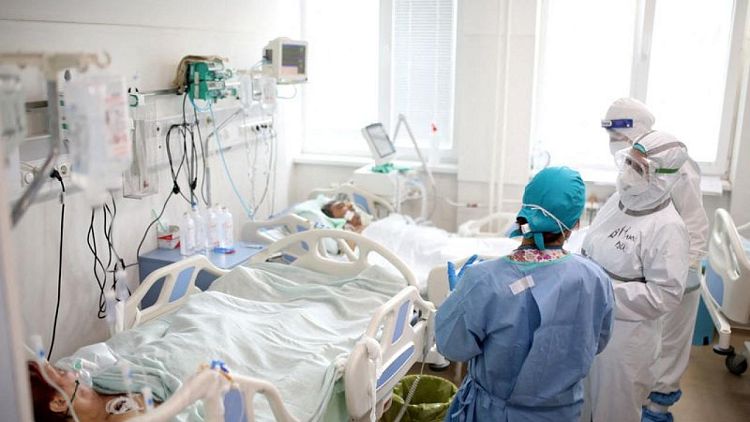By Nancy Lapid
- The following is a summary of some recent studies on COVID-19. They include research that warrants further study to corroborate the findings and that has yet to be certified by peer review.
COVID-19 patients face risks after hospital discharge
People face substantially higher risks of health problems in the months after being discharged from the hospital following a bout of COVID-19, researchers in England found.
Comparing 24,673 COVID-19 patients who survived at least a week after hospital discharge and 123,362 similarly aged people in the general population, they found the COVID-19 survivors had twice the risk of hospital admission or death during the next 10 months. Compared with 16,058 patients who had been hospitalized for influenza, the COVID-19 patients were 37% more likely to be readmitted or die due to their initial infection or other lower respiratory tract infection, and 37% more likely to experience cognitive-related admission or death, researchers reported in PLOS Medicine. COVID-19 patients with dementia who survived hospitalization were at particularly high risk for death in the months afterward, according to the report.
"Large numbers of people have been hospitalized with COVID-19... and the raised risks of death and readmission... could significantly impact public health and resources," the researchers wrote. "Risks might be minimized or mitigated by increasing monitoring of patients in the months following hospital discharge, and greater awareness among patients and clinicians of potential problems."
Heart returns to normal after rare post-COVID illness in kids
In children who develop the rare but life-threatening COVID-19-related multisystem inflammatory syndrome (MIS-C), heart function begins to recover within a week after diagnosis and returns to normal within three months, a new study suggests.
With onset about four-to-six weeks after exposure to COVID-19, MIS-C can cause inflammation in the heart, lungs, kidneys and gastrointestinal organs. Roughly four in five cases involve the child's left ventricle, which pumps blood to the rest of the body. Researchers studied 60 children hospitalized with MIS-C - 70% of whom had evidence of heart muscle injury - and 60 healthy children with normal hearts. Echocardiography and magnetic resonance imaging showed that all abnormalities in the hospitalized children "recovered quickly within the first week, followed by continued improvement and complete normalization by three months," researchers reported in the Journal of the American Heart Association. In half of the children, MIS-C-related heart function changes were gone within six days, they said.
The study did not evaluate the course of other after-effects. Still, said Dr. Anirban Banerjee of Children's Hospital of Philadelphia in a statement, "Recovery among these children was excellent." He added that the findings have important implications for managing children with MIS-C. "Our findings may also provide guidance for a gradual return to playing sports after cardiac clearance three to four months later."
Common protein helps virus unlock gateway into cells
When the SARS-CoV-2 spike breaks into cells via a "gateway" protein on cell surfaces called ACE2, a second cell-surface protein called vimentin facilitates the process, possibly by serving as a bridge between the virus and ACE2, new research suggests.
Using sophisticated analytical chemistry techniques, the researchers observed that vimentin attaches itself to the spike protein on the surface of the coronavirus. Based on their findings, they believe it might also attach itself to the ACE2 protein. In test tube experiments, they saw that when both vimentin and ACE2 are present, entry of the virus into the cells that line the blood vessels increases. They also found that depletion of vimentin significantly reduces SARS-CoV-2 infection of human cells, according to a report published in PNAS. Study coauthor Nader Rahimi of Boston University School of Medicine said his team found that a monoclonal antibody developed by Abcam Plc blocked vimentin from binding to the virus, in turn keeping the virus from entering the cells.
Vimentin is also found on cells lining the heart, the air sacs of the lungs, and the nose, the researchers noted. "Establishing the full range of the involvement of vimentin in viral entry and infection will require further investigations," the researchers said in a statement. They said they hope their findings will lead to new antiviral drugs that keep both ACE2 and vimentin from interacting with the coronavirus.
Click for a Reuters graphic https://tmsnrt.rs/3c7R3Bl on vaccines in development.



